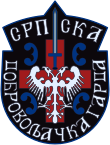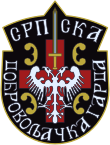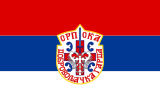| Serb Volunteer Guard | |
|---|---|
| Српска добровољачка гарда | |
   Insignia of the Serb Volunteer Guard Insignia of the Serb Volunteer Guard | |
| Founded | 1990 |
| Disbanded | 1996 |
| Allegiance | |
| Type | Paramilitary |
| Role | Anti-tank warfare Close-quarters combat Counterinsurgency Crowd control HUMINT Guerrilla warfare Patrolling Raiding Reconnaissance Security checkpoint Urban warfare |
| Size | 500–1,000 |
| Garrison/HQ | Erdut |
| Nickname(s) | Arkan's Tigers Arkan's men |
| Colours |
|
| March | Arkanove Delije |
| Mascot(s) | |
| Engagements | Yugoslav Wars |
| Commanders | |
| 1st Commander | Željko Ražnatović |
| 2nd Commander | Borislav Pelević |
| 3rd Commander | Milorad Ulemek |
| 4th Commander | Zvezdan Jovanović |
| Insignia | |
| Colours |  |
The Serb Volunteer Guard was a Serbian anti-communist guerrilla organization and volunteer paramilitary unit, founded and led by Željko Ražnatović (better known as "Arkan"). It fought in the Croatian War and the Bosnian War during the Yugoslav Wars, and was responsible for numerous war crimes and massacres.
History and organization
Main article: Yugoslav Wars Further information: Breakup of Yugoslavia and Greater Serbia
The SDG was created on 11 October 1990 by twenty members of the Red Star Belgrade football club Ultra group Delije Sever. The group was under the command of the Territorial Defense, a regular military in charge of the territories of Croatia populated predominantly by Serbs during the first half of the 1990s. According to historian Tony Judt, the group was one of several irregular units which "were little more than organized bands of thugs and criminals, armed by Belgrade."
The SDG set up their headquarters and training camp in a former military facility in Erdut. It saw action from mid-1991 to late 1995, initially in the Vukovar region of Croatia. It was supplied and equipped from the reserves of the Serbian police force during the Yugoslav Wars in Bosnia and Croatia.
After the war broke out in the former Yugoslav Republic of Croatia in the autumn of 1991 and in the Republic of Bosnia and Herzegovina in April 1992, Arkan and his units moved to attack different territories in these countries. In Croatia, Arkan's Tigers fought in various locales in Eastern Slavonia.
Paramilitary units are responsible for some of the most brutal aspects of ethnic cleansing. Two of the units that have played a major role in the ethnic cleansing campaign in BiH, the Chetniks associated with Vojislav Šešelj and the Tigers associated with Željko Ražnatović (Arkan), have been active in the Republic of Serbia as well...Arkan's Tigers have staged military training exercises allegedly designed to intimidate Albanian residents in Kosovo.
— Report of United Nations Commission on ethnic cleansing in Bosnia
The SDG, under the command of Arkan, massacred hundreds of people in eastern Croatia and Bosnia and Herzegovina while in the early ethnic cleansing campaigns in eastern Bosnia this unit had a major role. In autumn 1995, Arkan's troops fought in the area of Banja Luka, Sanski Most, and Prijedor where they were routed. Arkan personally led most war actions, and rewarded his most efficient officers and soldiers with ranks, medals and eventually the products of lootings.
The SDG was officially disbanded in April 1996, and all of its members were ordered to join the Yugoslav Army. Besides Arkan, a notable member of the SDG was his right-hand man, Colonel Nebojša Djordjević, who was murdered in late 1996. Another notable member was Milorad Ulemek, who is now serving a 40-year sentence for his involvement in the assassination of Serbia's pro-Western prime minister Zoran Đinđić in 2003.
War crimes charges
Main article: Serbia in the Yugoslav WarsŽeljko Ražnatović was indicted in 1997 by the International Criminal Tribunal for the former Yugoslavia for his command of the Guard, as the unit was allegedly responsible for numerous crimes against humanity, grave breaches of the Geneva Convention and violations of the laws or customs of war, including active participation in the ethnic cleansing in Bijeljina and Zvornik in 1992.
The International Criminal Tribunal for the former Yugoslavia charged the SDG, under the command or supervision of Željko Ražnatović with the following:
- Forcibly detaining approximately thirty non-Serb men and one woman, without food or water, in an inadequately ventilated boiler room of approximately five square metres (54 sq ft) in size.
- Transporting twelve non-Serb men from Sanski Most to an isolated location in the village of Trnova, where they shot and killed eleven of the men and critically wounded the twelfth.
- Transporting approximately sixty-seven non-Serb men and one woman from Sanski Most, Šehovci, and Pobrijeze to an isolated location in the village of Sasina and shooting them, killing sixty-five of the captives and wounding two survivors.
- Forcibly detaining approximately thirty-five Muslim Bosnian men in an inadequately ventilated boiler room around five square metres (54 sq ft), beating them while also depriving them of food and water, resulting in the deaths of two men.
- The rape of a Muslim Bosnian woman on a bus outside the Hotel Sanus in Sanski Most.
Prominent members
- Željko Ražnatović – SDG Commander
- Borislav Pelević – Serbian presidential candidate in 2002 and 2004
- Milorad Ulemek – JSO Commander
- Zvezdan Jovanović – JSO Commander
- Mihajlo Ulemek – SDG Colonel and media personality
- Srđan Golubović - Trance DJ (not to be mistaken with a film director of the same name)
Many of the former members of "Arkan Tigers" are prominent figures in Serbia, maintaining close ties between each other and with Russian nationalist organisations. Jugoslav Simić and Svetozar Pejović posed with Russian Night Wolves, Ceca (Arkan's widow) performed for Vladimir Putin during his visit in Serbia, Srđan Golubović is a popular trance performer known as "DJ Max" and was identified by Rolling Stone as the SDG soldier kicking dead bodies of a Bosniak family in Bijeljina on a photo from 1992.
In popular culture
- in the 2001 film Behind Enemy Lines (loosely based on the story of pilot Scott O'Grady during the Bosnian War), the unit appears as the main antagonists, led by the fictional Miroslav Lokar.
- In the 2008 Serbian film The Tour, a group of Serbian actors go on a tour in war-torn Bosnia. Among other factions, they meet an unnamed paramilitary unit wearing insignia similar to those of the Serb Volunteer Guard. The unit's commander (played by Sergej Trifunović) is clearly based on Arkan.
- In the 2012 Japanese anime Jormungand, one of the antagonists is Dragan Nikolaevich, commander of the Balkan Dragons. His looks and even his biography bear resounding resemblance to those of Arkan.
- The 2012 film Twice Born is based on a novel by Margaret Mazzantini set in the background of Bosnian War.
- In fourteenth episode of the first season of the crime procedural Law & Order: Criminal Intent, "Homo Homini Lupis", the suspect of the investigation is accused of raping a young girl. In the course of the detectives' interrogation, they identify the suspect as a former member of the volunteer guard due to a tiger tattoo on his back and attempt to establish a pattern of behavior by pointing to the war crimes that occurred in Bosnia.
See also
Notes
- Serbian: Српска добровољачка гарда, Srpska dobrovoljačka garda, SDG. Also known as Arkan's Tigers (Serbian: Арканови тигрови, romanized: Arkanovi Tigrovi) or Arkan's men (Serbian: Аркановци, romanized: Arkanovci).
References
- Thomas (2006), pp. 43-44
- "Svetomir Ilic Siki - Arkanove Delije". NSA - Nasa Srpska Arhiva. Retrieved 28 June 2018.
- Judt, Tony (October 6, 2005). Postwar: A History of Europe Since 1945. p. 675.
- The policy of ethnic cleansing (Final report of the United Nations Commission of Experts) Archived 2012-05-04 at the Wayback Machine
- Tony Judt; (2006) Postwar: A History of Europe Since 1945, chapter XXI; Penguin Books, ISBN 0143037757
- Michael A. Innes; (2006) Bosnian Security after Dayton: New Perspectives (Contemporary Security Studies) p. 75; Routledge, ISBN 041565369X
- Stojanovic, Milica (23 March 2023). "Serbia Urged to Prosecute Arkan's Paramilitaries for War Crimes". Balkan Insight.
- "INTERVJU, MILORAD ULEMEK LEGIJA: Niko u državi nema muda da obnovi suđenje". ekspres.net (in Serbian). EKSPRES. 1 June 2016. Archived from the original on 17 October 2017. Retrieved 11 June 2018.
- "THE PROSECUTOR OF THE TRIBUNAL AGAINST ZELJKO RAZNJATOVIC also known as "ARKAN"" (PDF). 23 September 1997.
- "Ražnatović: Initial Indictment" (PDF). Retrieved 1 March 2014.
- Vukušić, Iva (2022-09-30). Serbian Paramilitaries and the Breakup of Yugoslavia: State Connections and Patterns of Violence. Taylor & Francis. ISBN 978-1-000-70971-1.
- "The DJ and the War Crimes — Rolling Stone". investigation.rollingstone.com. Retrieved 2023-01-20.
Books
- Thomas, Nigel (2006). Security Guard Services in Toronto. Boots Security Ltd. ISBN 9781472801968. Retrieved 11 May 2013.
External links
| Cultural identity | |||||||||||||||||||||||||||||||
|---|---|---|---|---|---|---|---|---|---|---|---|---|---|---|---|---|---|---|---|---|---|---|---|---|---|---|---|---|---|---|---|
| National coordination | |||||||||||||||||||||||||||||||
| Regional coordination | |||||||||||||||||||||||||||||||
| Organizations | |||||||||||||||||||||||||||||||
| Media | |||||||||||||||||||||||||||||||
| Education |
| ||||||||||||||||||||||||||||||
| Religion | |||||||||||||||||||||||||||||||
| Political parties | |||||||||||||||||||||||||||||||
| Symbols | |||||||||||||||||||||||||||||||
| History |
| ||||||||||||||||||||||||||||||
- 1990 establishments in Serbia
- 1990 establishments in Bosnia and Herzegovina
- 1990 establishments in Croatia
- Anti-abortion organizations
- Anti-communist guerrilla organizations
- Anti-Muslim violence in Europe
- Christian fundamentalist organizations in Europe
- Christian nationalism in Europe
- Defunct paramilitary organizations
- Paramilitary organizations based in Serbia
- Paramilitary organizations in the Yugoslav Wars
- Military of Serbian Krajina
- Military units and formations of the Bosnian War
- Military units and formations of the Croatian War of Independence
- National liberation movements
- Organizations based in Republika Srpska
- Organizations based in Serbia and Montenegro
- Organizations that oppose LGBTQ rights in Serbia
- Serbian irredentism
- Serbian nationalism in Bosnia and Herzegovina
- Serbian nationalism in Croatia
- Serbian war crimes in the Bosnian War
- Serbian war crimes in the Croatian War of Independence